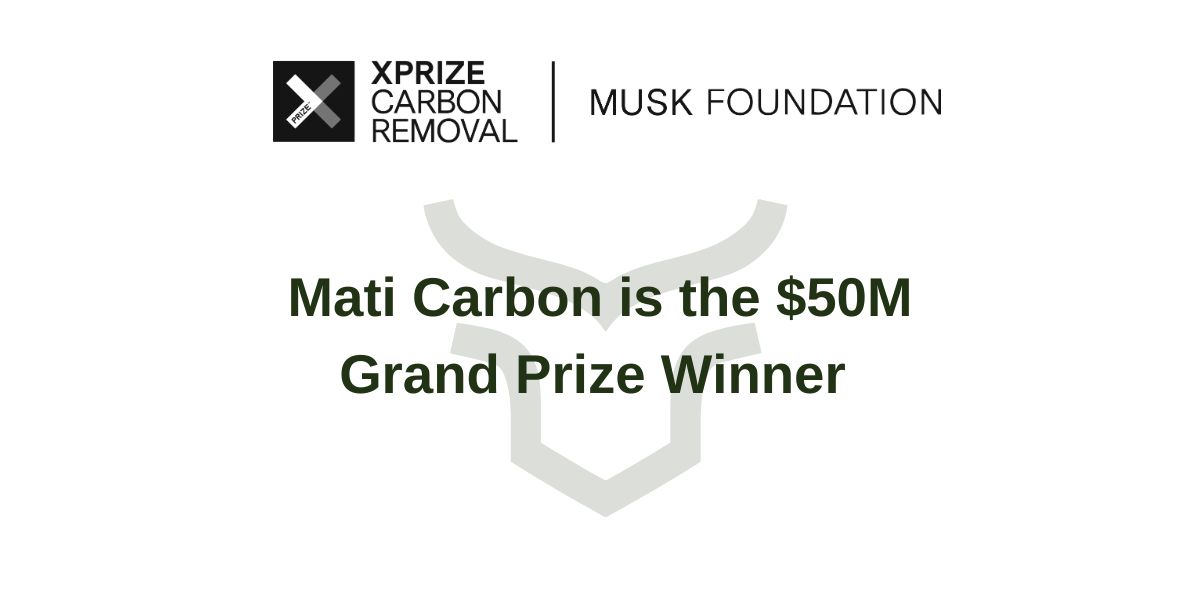The XPRIZE Carbon Removal competition is a $100 million global challenge intended to accelerate scalable solutions for removing carbon dioxide from the atmosphere. Launched in 2021, it drew over 1,300 teams from 112 countries, each aiming to demonstrate the ability to remove at least 1,000 metric tons of CO₂ from the atmosphere. Founded in 2022, Mati was selected in 2024 as one of 20 global finalists and has won the $50 million grand prize for its scalable, scientifically robust, and cost-effective strategy.
“Winning this XPRIZE competition is an incredible honor and a definitive validation of our research and development, and building out the infrastructure needed to impact millions of farmers while delivering verifiable carbon dioxide removal at a gigaton scale. I couldn’t be prouder, not just of the Mati team, but of our collaborators, research partners and the thousands of smallholder farmers who let us be part of their lives,” said Mati Carbon Founder and CEO Shantanu Agarwal. “This XPRIZE recognition will allow us to collaborate with local partners to accelerate the use of enhanced rock weathering across the Global South.”
Excess greenhouse gases in the Earth’s atmosphere and oceans due to human activity is driving climate change. Carbon dioxide emissions currently account for more than two-thirds of all anthropogenic greenhouse gas emissions. In addition to dramatic reductions of greenhouse gas emissions, the removal and storage of carbon dioxide is necessary to stop average global temperature from rising more than 2°C above pre-industrial levels. Beyond the 2°C threshold, scientists overwhelmingly agree that there will be irreversible ecological damage and an increase in calamitous weather events that will result in the losses of human life, livelihood and property. Extreme weather events have an outsized effect on the smallholder farmers that Mati partners with who live and work with limited infrastructure and financial resources.
At the heart of Mati’s impact is a transformative locally-led model for smallholder farmers. By applying basalt free of cost to farmlands, Mati not only removes atmospheric CO₂ but also restores vital nutrients to degraded soils, improving smallholder farmers’ yields by an average of 20%. These yield increases translate to a substantial boost in income – enough to pay off debts, invest in better farm inputs, and build resilience against climate change. In regions with poor access to fertilizers and financial tools such as credit, this intervention offers a rare win-win: agronomic empowerment and planetary healing.
“The current scientific literature suggests that ERW can provide a durable pathway to remove and sequester carbon dioxide from the atmosphere with a duration of about 10,000 years,” added Mati Carbon Chief Science Officer Jake Jordan. “We offer this mode of carbon dioxide removal through a program that is expressly built to benefit a population of farmers who are among the least responsible for and most vulnerable to the impacts of climate change.”
Mati’s deployment strategy stands out for its favorable cost-to-performance ratio. Through the course of working with thousands of smallholder farmer partners, Mati developed “matiC”—a proprietary, ERW-specific enterprise resource planning platform that provides end-to-end sample and data traceability. matiC integrates and optimizes every part of the operation, from farmer engagement, to logistics and laboratory workflows to AI-powered field verification. To ensure scientific integrity, Mati also built a high-throughput system for measuring key soil properties and quantifying carbon removal. This robust Monitoring, Reporting, and Verification (MRV) framework—developed in partnership with IIT Kanpur and Yale University—enables precise, transparent crediting of carbon removals. Together, Mati’s integrated techstack and operational efficiency deliver a best-in-class pathway to scalable, affordable, and verifiable carbon credits among ERW providers.
Mati intends to use the XPRIZE recognition as a springboard to scale its efforts working with smallholder farmers worldwide. Beyond the award, Mati will make its smallholder-focused model self-sustaining through its sale of CDR credits. The company already counts Shopify, Stripe, and H&M among its early carbon credit buyers.
“As a Mati Carbon customer, Shopify is thrilled with their XPRIZE recognition and the catalytic impact this will have on their growth,” said Mitchel Selby, Lead, Sustainability Fund at Shopify. “We’ve been extremely impressed by Mati’s MRV capabilities and positive impact on smallholder farmers in the Global South. This support will undoubtedly help them scale faster.”
The Mati Carbon project is supported by a US 501(c)(3) non-profit, Swaniti Initiative. Mati accelerates the natural process of rock weathering (ERW) by applying pulverized basalt to croplands of partnered smallholder farmers free of charge. As the pulverized basalt weathers, it removes carbon dioxide from the atmosphere. Meanwhile, the weathering process releases nutrients from the rock which acts to re-mineralize depleted agricultural soils. This increases crop yields and thus smallholder farmers’ incomes. At present, the company is on pace to work with 30,000 farmers in India, Tanzania, and Zambia by the end of 2025. Mati is set on a planetary-scale mission to make ERW a common agricultural practice in order to benefit 100 million smallholder farmers in developing economies over the next 20 years.
